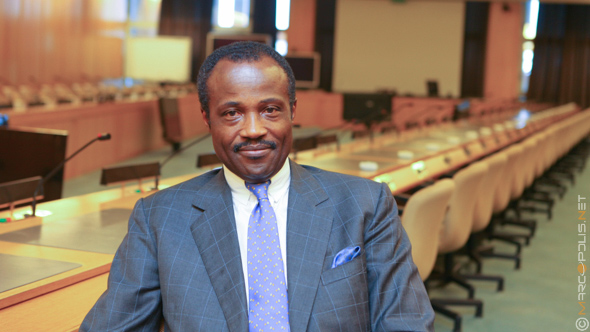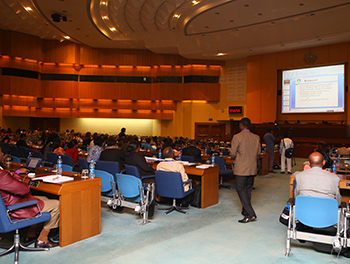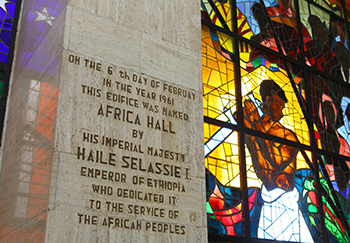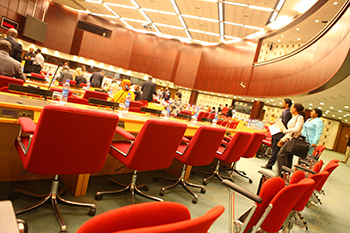Addis Ababa is becoming a hub for international conferences and meetings in Africa, says UN Conference Center
Gerard Hounkponou, Chief of UN Conference Centre (Conference Coordination Unit, Conference Services Section)
The UN Conference Centre in Addis Ababa has a particular mandate which is not only attending to government conferences but also to the great number of conferences in relation to NGOs and civil society organizations. In partnership with the Ethiopian government, the goal is to market Addis Ababa as a conference hub in Africa, thus exposing local investment opportunities and attracting new flow of investments into Ethiopia.
Interview with Gerard Hounkponou, Chief of UN Conference Centre (Conference Coordination Unit, Conference Services Section)

Could you give us a brief history of the United Nations Conference Centre and the role it plays within the region?
The UN Conference Centre was built some twelve years ago, after the General Assembly of the United Nations in New York decided to build it here in Ethiopia. It is the main hub for conferences and meetings in Ethiopia. We are particularly fortunate to have this conference centre because Ethiopia, particularly Addis Ababa is becoming a hub itself for conferences, and for the member states of the UN. We of course are holding several meetings here, ranging from meetings of Heads of States, to statutory meetings i.e. ministerial meetings and also conferences for different sectors.
What is your outlook for the development of Ethiopia and Africa moving forward?
 As you know, Ethiopia has a growing economy with a two digit growth rate. It is one of the few countries in Africa that is growing exponentially in a variety of sectors. We believe that the amount of interest for investment as well as partnerships in Ethiopia is indeed growing. In that regard, we are regularly witnessing a growing number of conferences held in Addis Ababa, from both the private sector as well as from the public sector. We believe that in the next few years Ethiopia will be a major hub for conferences and meetings not only in this region of Eastern Africa but also in Africa as a whole.
As you know, Ethiopia has a growing economy with a two digit growth rate. It is one of the few countries in Africa that is growing exponentially in a variety of sectors. We believe that the amount of interest for investment as well as partnerships in Ethiopia is indeed growing. In that regard, we are regularly witnessing a growing number of conferences held in Addis Ababa, from both the private sector as well as from the public sector. We believe that in the next few years Ethiopia will be a major hub for conferences and meetings not only in this region of Eastern Africa but also in Africa as a whole.
You play a huge role in the Ethiopian development as well as in terms of employment, can you tell us a bit more about this?
The Ethiopian economy is growing in many sectors. The country´s potential in terms of resources is showing that Ethiopia will very soon be one of the leading economies in the African continent. It has a great deal of potential for exports such as coffee. Coffee takes its name from the region in Ethiopia called Kaffa, where coffee was originally discovered. Ethiopia is also very well known for Lucy: the very first skeleton to have been discovered in Africa, and which is considered as the beginning of mankind. Notwithstanding these important elements, Ethiopia has strong potentials for attracting further investment opportunities and partnerships. Here in the UN Conference Centre, we are partnering with the Ethiopian government in the tourism sector in particular to market Ethiopia and particularly Addis Ababa as a tourism and conference hub in Africa, in order to enhance the visibility and brand of Ethiopia in the world.
Addis Ababa is becoming a hub itself for conferences, including those of the member states of the UN.
What marketing strategy have you adopted here at the UN Conference Centre?
Our strategy is very focused in terms of addressing the visibility of Addis Ababa in particular and Ethiopia as a whole in the world. Basically we partner in various areas with the Ethiopian government and we jointly brainstorm on various aspects and possibilities for marketing opportunities. One main area of focus is how to attract a greater number of conferences, meetings and also investors to Addis Ababa. More importantly we try to ensure that most of the conferences that are of great importance in Africa are held here in Addis Ababa, so as to promote the country not only in terms of conferences but also tourism and investment.
Can you tell us a bit about business tourism in Addis Ababa and the role you play in order to promote it internationally?
You would be amazed to see the number of resorts and potential opportunities for tourism in Ethiopia. Ethiopia is indeed a vast country, more than three times the size of France. The entire population is close to 90 million. The city population is close to 8 million, and the city is still booming. Hence opportunities for tourism are huge. In the northern part of Ethiopia, area depicting rock-hewn churches can be visited in a place called Lalibela, where the number of tourists per year is fast growing.  Various resorts are available in the southern region of Ethiopia, and all those elements are conducive to increasing the number of tourists coming to Ethiopia.
Various resorts are available in the southern region of Ethiopia, and all those elements are conducive to increasing the number of tourists coming to Ethiopia.
Our Conference Centre therefore is mainly partnering with Ethiopia to make sure that those delegates who come here for meetings are also potential tourists. We have witnessed many cases whereby those delegates have come back as tourists, and their stay and visit greatly organized by the Ethiopian government and the Addis Ababa Tourism authorities. I think this makes a great impact on the tourism industry here and is indeed a great achievement.
I´m sure that the Conference Centre for its size alone plays an incredible role in terms of social responsibility, not only in Addis Ababa but in Ethiopia in general.
The Conference Centre here has a particular mandate, which is not only attending to government conferences but also to the great number of conferences which are related to NGOs and Civil Society Organizations, which are a very important elements in supporting the work of the Ethiopian government when it comes to social concerns. Ethiopia has been recently coming out of a struggle of socio-economic challenges which have been addressed in a holistic manner, in order to be at par with the level of development in other part of the continent in particular, and the world in general. We believe that we are here to support the social sector, which is indeed a major challenge for Ethiopia, through the convening of major social conferences and meetings, which are supported by various partners of Ethiopia. Hence we work very closely indeed with the Ethiopian government in terms of addressing social concerns through the relevant number of meetings, seminars, workshops and conferences held in Addis Ababa.
 Could you share with us your vision for Ethiopia and for Africa as a whole?
Could you share with us your vision for Ethiopia and for Africa as a whole?
My personal vision is that it is very important, as can be witnessed in the whole world at the moment, for us to come up in Africa and have what we call real economic integration. This will happen soon I’m sure. We need to have a synergetic harmonisation in all sectors, I mean we need to face and facilitate critical areas and sectors such as customs, immigration, tariffs, intra-African trade, going through west to east without having to have different visas etc. I think that economic integration is my vision for Africa and I think we are making steady progress towards achieving this goal, Indeed, in West Africa we have the ECOWAS, which is the Economic Commission for West African states, and there is the SADC, which is the Southern Africa Development Community, and you have the IGAD which is the Intergovernmental Authority on Development. These are building blocks to reaching economic integration here in Africa, so that we can be a competitive continent vis-à-vis those growing economies such as China for example, and which, as a matter of fact, do support Africa in the area of South-South cooperation. I strongly believe in it, and it is the vision shared by the founding fathers of the Organization of African Unity which was established in 1963.
Thank you.
FAIR USE POLICY
This material (including media content) may not be published, broadcasted, rewritten, or redistributed. However, linking directly to the page (including the source, i.e. Marcopolis.net) is permitted and encouraged.